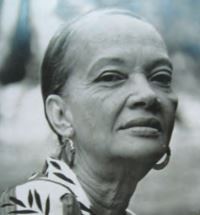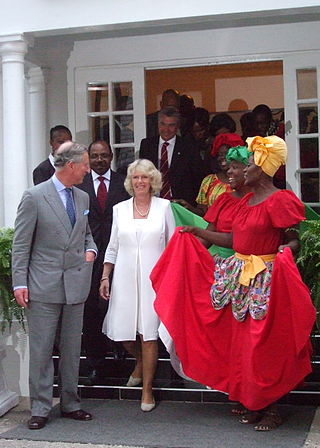
Eric Eustace Williams was a Trinidad and Tobago politician who is regarded by some as the "Father of the Nation", having led the then British Colony of Trinidad and Tobago to majority rule on 28 October 1956, to independence on 31 August 1962, and republic status on 1 August 1976, leading an unbroken string of general elections victories with his political party, the People's National Movement, until his death in 1981. He was the first Prime Minister of Trinidad and Tobago and also a noted Caribbean historian, especially for his book entitled Capitalism and Slavery.

Queen Nanny, Granny Nanny, or Nanny of the Maroons ONH, was an 18th-century leader of the Jamaican Maroons. She led a community of formerly enslaved Africans called the Windward Maroons. In the early 18th century, under the leadership of Nanny, the Windward Maroons fought a guerrilla war over many years against British authorities in the Colony of Jamaica in what became known as the First Maroon War.

The University of the West Indies (UWI), originally University College of the West Indies, is a public university system established to serve the higher education needs of the residents of 18 English-speaking countries and territories in the Caribbean: Anguilla, Antigua and Barbuda, The Bahamas, Barbados, Belize, Bermuda, British Virgin Islands, Cayman Islands, Dominica, Grenada, Guyana, Jamaica, Montserrat, Saint Kitts and Nevis, Saint Lucia, Saint Vincent and the Grenadines, Trinidad and Tobago, and Turks and Caicos Islands. Each country is either a member of the Commonwealth of Nations or a British Overseas Territory. The aim of the university is to help "unlock the potential for economic and cultural growth" in the West Indies, thus allowing improved regional autonomy. The university was originally instituted as an independent external college of the University of London.

Slavery in the British and French Caribbean refers to slavery in the parts of the Caribbean dominated by France or the British Empire.
Sabina Park is a cricket ground and the home of the Kingston Cricket Club, and is the only Test cricket ground in Kingston, Jamaica.
Kimberly-Ann Robinson-Walcott is a Jamaican poet and editor. She has been the editor-in-chief of the Jamaica Journal since 2004 and editor-in-chief of the Caribbean Quarterly since 2010. Robinson-Walcott is the author of a study of the white Jamaican novelist Anthony Winkler, called Out of Order! (2006).

Charles Rose Ellis, 1st Baron Seaford was a British politician, sugar planter, and slave holder.
Indo-Jamaicans are the descendants of people who came from the Indian subcontinent to Jamaica. Indians form the third largest ethnic group in Jamaica after Africans and Multiracials.
Richard Hart was a Jamaican historian, solicitor and politician. He was a founding member of the People's National Party (PNP) and one of the pioneers of Marxism in Jamaica. He played an important role in Jamaican politics in the years leading up to Independence in 1962. He subsequently was based in Guyana for two years, before relocating to London in 1965, working as a solicitor and co-founding the campaigning organisation Caribbean Labour Solidarity in 1974. He went on to serve as attorney-general in Grenada under the People's Revolutionary Government in 1983. He spent the latter years of his life in the UK, where he died in Bristol.

Dame Elsie Payne was a teacher and following independence she became the first Barbadian-born principal of Queen's College in Bridgetown. She was the first woman knighted in Barbados for her long dedication to education and the nation.
Franklin W. Knight is a Jamaican historian of Latin America and the Caribbean. He is an emeritus professor at Johns Hopkins University, where he was the Leonard and Helen R. Stulman Professor of History from 1993 to 2014 and director of the Centre for Africana Studies. He was awarded a Gold Musgrave Medal for literature in 2013.

Jamaican nationality law is regulated by the 1962 Constitution of Jamaica, as amended; the Nationality Act of 1962, and its revisions; and various British Nationality laws. These laws determine who is, or is eligible to be, a national of Jamaica. Jamaican nationality is typically obtained either on the principle of jus soli, i.e. by birth in Jamaica; or under the rules of jus sanguinis, i.e. by birth abroad to parents with Jamaican nationality. It can also be granted to persons with an affiliation to the country, or to a permanent resident who has lived in the country for a given period of time through naturalisation. There is not currently a program in Jamaica for persons to acquire nationality through investment in the country. Nationality establishes one's international identity as a member of a sovereign nation. Though it is not synonymous with citizenship, for rights granted under domestic law for domestic purposes, the United Kingdom, and thus the commonwealth, have traditionally used the words interchangeably.
Verene Albertha Shepherd is a Jamaican academic who is a professor of social history at the University of the West Indies in Mona. She is the director of the university's Institute for Gender and Development Studies, and specialises in Jamaican social history and diaspora studies.

Gema Ramkeesoon was a Trinidadian and Tobagonian social worker and women's rights activist who was one of the early pioneers of the women's movement in Trinidad and Tobago. She was honored for her social service work as a member of the Order of the British Empire in 1950 and received the gold Hummingbird Medal from Trinidad and Tobago in 1976.
Bridget Jones was a British literary academic who pioneered the inclusion of Caribbean literature in European university studies programs. While teaching French literature at the University of the West Indies, Jones developed an interest in French Caribbean writing and developed one of the first PhD curricula focused on francophone Caribbean literature. Upon returning to England, she taught at the University of Reading and the Roehampton Institute. An annual award, distributed by the Society for Caribbean Studies, as well as a scholarship program, given by the University of the West Indies, are named in her honour.
Barry William Higman is a retired Australian historian of Caribbean studies who primarily taught at the University of the West Indies from 1971 to 1996. During his career, Higman wrote multiple books including the 1977 Bancroft Prize winning work Slave Population and Economy in Jamaica, 1807-1834 before his retirement from academics in 2014. Higman was awarded a Guggenheim Fellowship in 1987 and the Musgrave Medal in 1992.
The Jamaican Historical Society is a local history society in Jamaica. The society publishes a journal, the Jamaican Historical Review, as well as a Bulletin.

Hedley Powell Jacobs was an English journalist, historian, writer, and socialist, who emigrated to Jamaica and was one of the founders of the People's National Party in 1938.
Maureen Warner-Lewis is a Trinidadian and Tobagonian academic whose career focused on the linguistic heritage and unique cultural traditions of the African diaspora of the Caribbean. Her area of focus has been to recover the links between African cultures and Caribbean cultures. She has been awarded multiple prizes for her works, including two Gordon K. and Sybil Lewis Awards, the Gold Musgrave Medal of the Institute of Jamaica, and she was inducted into the Literary Hall of Fame of Tobago.

Royal tours of Jamaica by the Jamaican Royal Family have been taking place since the 20th century. Elizabeth II, Queen of Jamaica, visited the island six times; in 1953, 1966, 1975, 1983, 1994, and 2002.










